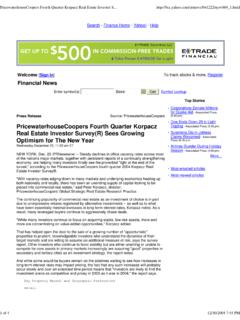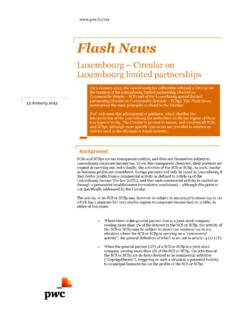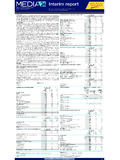Transcription of section 200A, has decided that a C, in the context …
1 Tax Insights from India Tax & Regulatory Services Gujarat HC, in the context of section 200a , has decided that a machinery provision cannot override or overrule a charging section July 17, 2017 In brief In a recent judgement1, the High Court (HC) of Gujarat observed that section 200a of the Income-tax Act, 1961 (the Act) is a machinery provision and cannot govern a charging provision. The Revenue could always levy fee in terms of section 234E of the Act even prior to the amendment in section 200a of the Act. Thus, section 200a of the Act is a machinery provision that provides for a mechanism for processing and computing amongst others, fee payable under section 234E of the Act.
2 In detail Facts The taxpayer was an individual engaged in the business of manufacture and trading of ladies garments. In the course of the business, the taxpayer was required to withhold tax and remit the same on various payments. The provisions under the Act would further require the taxpayer to file periodic statements of such tax withheld and deposited with the Government within the time prescribed. The Tax Officer (TO) issued an intimation under section 200a of the Act adjusting a sum of INR 33,123 by way of late filing fee under section 234E of the Act in respect of withholding tax 1 [2017] 83 137 statements filed prior to 01 June, 2015.
3 Issue before the HC Rule 31A of the Income-tax Rules, 1962 insofar as it prescribes longer period for the Government to file the statements as compared to the other taxpayers was discriminatory and arbitrary and therefore unconstitutional. Whether the TO could levy fee under section 234E of the Act while processing the withholding tax statements under section 200a filed prior to 01 June, 2015. Taxpayers contention With regard to constitutional validity of the Rule 31A, it was submitted that the special concession to the Government agencies was wholly unnecessary and not based on any rational. The same difficulties and complexities which was faced by the Government agencies would also be faced by the individual taxpayers.
4 Prior to the amendment in section 200a , there was no mechanism provided under the Act for collection of fee under section 234E of the Act. that prior to 01 June 2015, the TO was not empowered to charge fee under section 234E of the Act and that the amendment in section 200a with effect from 01 June, 2015 could not have retrospective effect. that in the absence of a machinery provision, the levy itself would fail. Tax Insights PwC Page 2 Revenue s contention With reference to Rule 31A, considering the multi-layered system of operation of the Government agencies and overall workload, the legislature thought it fit to grant 15 days additional time to the Government agencies to file the statements.
5 This was therefore not a case of discrimination, but a case of reasonable classification. section 200a is a machinery provision whereas section 234E is a charging provision. A machinery provision cannot govern a charging provision. Even in the absence of amendment in section 200a , the TO was always authorised to levy fee in terms of section 234E of the Act. The amendment in section 200a should have been seen as clarificatory in nature. High Court s ruling Prior to 01 July, 2012, the Act contained a single provision in section 272A providing for penalty in case of default in filing the withholding tax statements. With effect from 01 July, 2012, three major changes were introduced in the Act- section 234E was introduced to levy fee of INR 200 per day for every day of default in case of late filing of the withholding tax statements; section 271H was introduced to levy penalty for failure to furnish withholding tax statements.
6 No penalty would be imposed if the tax was deposited with fee and interest and the statement was filed within one year of the due date; Proviso to clause (k) of sub- section (2) of section 272A was inserted to limit the effect of the said provision upto 01 July, 2012. The intent of section 234E is to make withholding tax compliance more stringent. section 200a provides for the procedure of processing of withholding tax statements and authorises the TO to make certain prima-facie adjustments. section 200a was amended with effect from 01 June, 2015 to include the adjustment to be made by the TO in respect of levy under section 234E while processing the withholding tax statements. A machinery provision cannot override a charging provision.
7 section 200a does not create any charge and merely provides a mechanism for processing the withholding tax statements. When section 234E has already created a charge for levying fee that would thereafter not been necessary to have yet another provision creating the same charge. It would be inappropriate that the fee under section 234E could not be levied in the absence of a regulatory provision section 200a of the Act. Even in the absence of amendment in section 200a , it was always open for the Revenue to charge the fee in terms of section 234E of the Act. With the amendment, the adjustment was brought within the fold of section 200a of the Act. Hence, the amendment was clarificatory in nature.
8 section 200a is not a source of substantive power. Substantive power to levy fee could be traced to section 234E of the Act. Further, the fee under section 234E of the Act is not in lieu of the penalty of section 271H of the Act. Both are independent levies. Article 14 of the Constitution of India does not bar reasonable classification. The takeaways The HC highlighted that a machinery provision cannot govern a charging provision. The HC while pronouncing the judgement clarified that the amendment in section 200a is clarificatory in nature. Let s talk For a deeper discussion of how this issue might affect your business, please contact your local PwC advisor. Tax Insights For private circulation only This publication has been prepared for general guidance on matters of interest only, and does not constitute professional advice.
9 You should not act upon the information contained in this publication without obtaining specific professional advice. No representation or warranty (express or implied) is given as to the accuracy or completeness of the information contained in this publication, and, to the extent permitted by law, PwCPL, its members, employees and agents accept no liability, and disclaim all responsibility, for the consequences of you or anyone else acting, or refraining to act, in reliance on the information contained in this publication or for any decision based on it. Without prior permission of PwCPL, this publication may not be quoted in whole or in part or otherwise referred to in any documents.
10 2017 PricewaterhouseCoopers Private Limited. All rights reserved. In this document, PwC refers to PricewaterhouseCoopers Private Limited (a limited liability company in India having Corporate Identity Number or CIN : U74140WB1983 PTC036093), which is a member firm of PricewaterhouseCoopers International Limited (PwCIL), each member firm of which is a separate legal entity. About PwC At PwC, our purpose is to build trust in society and solve important problems. We re a network of firms in 157 countries with more than 223,000 people who are committed to delivering quality in assurance, advisory and tax services. Find out more and tell us what matters to you by visiting us at In India, PwC has offices in these cities: Ahmedabad, Bengaluru, Chennai, Delhi NCR (Gurgaon), Hyderabad, Kolkata, Mumbai and Pune.















